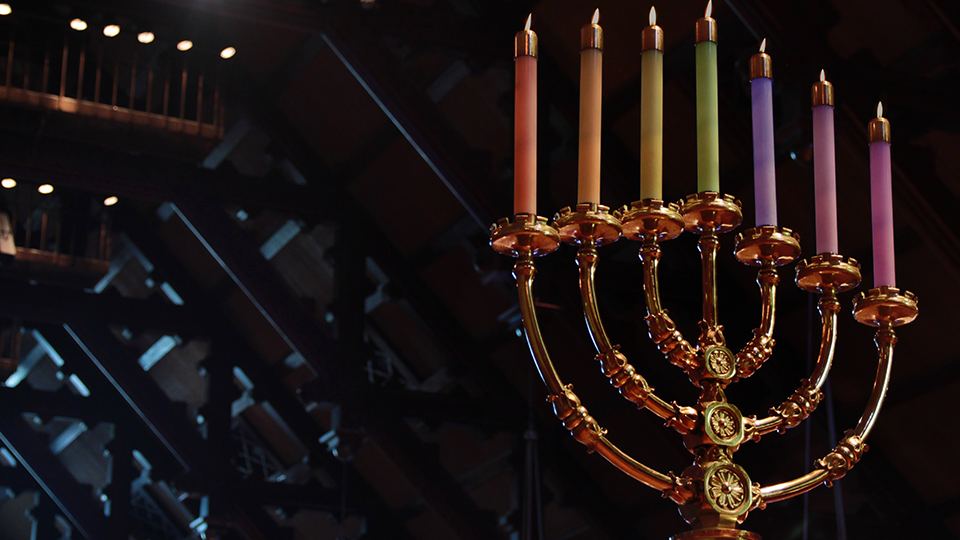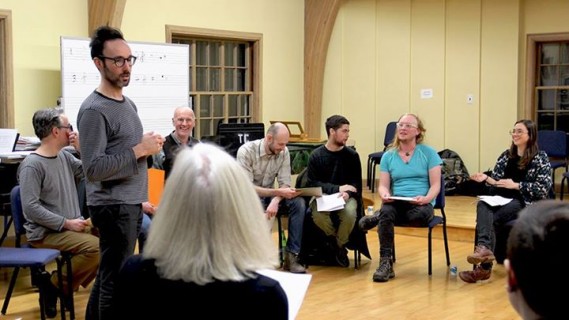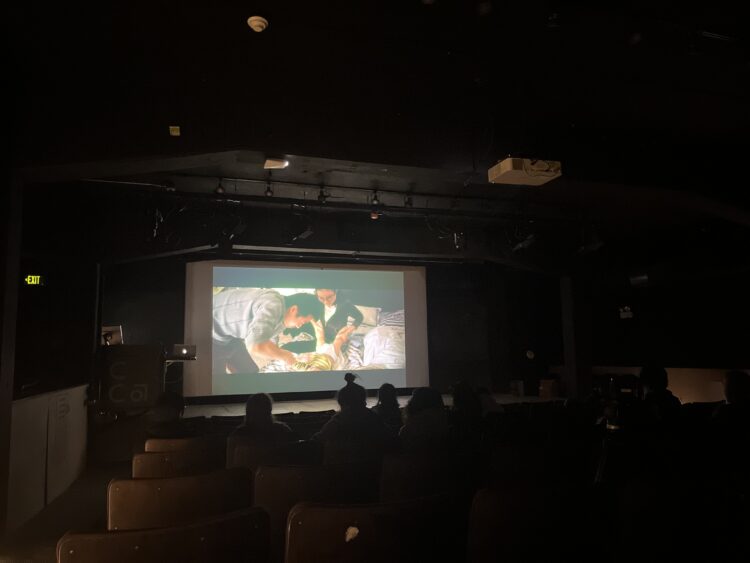Holcombe Waller Composes a Requiem Mass Honoring Gender and Sexual Diversity

Next week, Holcombe Waller premieres his Creative Capital project, Requiem Mass: LGBT / Working Title, in Portland, Oregon in conjunction with PICA’s TBA Festival. Waller’s Requiem Mass is a ceremonial choral work that explores contemporary faith, advocacy through art, and collective catharsis. Performed in historic Trinity Episcopal Cathedral with an all-abilities community choir drawn from all walks of life, the Requiem is an emotional and personal work invoking remembrance and peace for the dead who have suffered persecution for their sexual orientation or gender expression. Requiem Mass was informed by research into the pivotal gay history from the 1980s through present day and by community engagement that has included working with experts in liturgical music, queer theory, faith-based equality initiatives as well as over 100 participants in a series of choral workshops with Waller over the past year.
Jenny Gill connected with Holcombe to learn more about the Requiem Mass and the community he has built around this work.
Jenny Gill: Music has such amazing potential to reach people on a personal and emotional level. Are there any particular musical works—religious or otherwise—that have deeply affected you, or inspired you, or provoked you?
Holcombe Waller: A few of the first pieces of music that come to mind in terms of my Requiem Project: Roger and Hammerstein’s amazing activist show tune, “You’ve Got to Be Carefully Taught,” from South Pacific, definitely changed my world. In many ways, the “Dies Irae” section of my Requiem—which I’ve titled “What’s Next”—is rooted in a similar style of musical theater social activism, albeit with a nod to the Dies Irae of Verde’s Requiem.
If you allow me a broad generalization, I’m really jazzed by French romantic and impressionistic composers, and Fauré’s Requiem stands out as among my favorites of all the Requiems I revisited when writing these songs. I feel like a teenager admitting they love The Fountainhead (this phase lasted 3 months for me, for the record) when I tell you that my first listen to Messiaen’s “Quartet for the End of Time” is basically one of the most intense things that’s ever happened to me, aside from birth and my 2001 car accident.
In the midst of me completing a lot of the core composition of this project, Obama sang “Amazing Grace” at the eulogy for Rev. Clementa Pinckney—I mean, boom. Presidential mic drop. I felt pretty changed. His choice to sing in that moment, and to sing that spiritual, was basically everything to me.
Jenny: The staging of Requiem Mass: LBGT / Working Title at Trinity Cathedral is the result of a year-long community engagement effort. Can you talk about the partners that have helped this performance come together and what your process has been like in working with locals in Portland?
Holcombe: I first pitched this project to Angela Mattox, Artistic Director of Portland Institute for Contemporary Art, over three years ago, and she was really excited by it and became the lead (and actually, the only) commissioning and presenting partner. I engaged the Rev. Canon Nathan LeRud of Trinity Cathedral for some liturgical guidance and “dramaturgy,” and through his leadership Trinity became the lead civic partner, hosting a lot of the rehearsals as well as the premiere performance and contributing a huge amount of outreach support, as well as human talent, such as their amazing resident organist, Bruce Neswick, and many other members of staff who have helped along the way. Angela gave PICA’s head of community engagement, Roya Amirsoleymani, a lot of license to engage with the project as a priority, and Roya became like a “Community Producer” in my mind—a role I’ve never really heard of, but one that became essential to the project.

Under Roya’s producing initiative in this role, we held two larger-scale “symposium-like” events between September and February which invited local and national experts in areas of liturgical music, the advancement of gender and sexual diversities (GSD) within communities of faith, as well as community activism to join round-table discussions and public talks and engagement sessions. The list of participants is long, but includes people from the Human Rights Campaign, Harvard Divinity School, and Auburn Seminary, as well as local Portland representation from Q Center, Ecumenical Ministries of Oregon, United Church of Christ, The Community of Welcoming Congregations, and many others. These experiences formed, for me, a kind of road-map for the project’s aim: to make a grand gesture of inserting the GSD voice into the canon of Christian liturgical music.
But in the end, what really came through as the primary social function of the project was actually the fellowship of singers. Through a very open-palms call out, we engaged about 150 singers across dozens of workshops in which we talked, sang, practiced, wrote a bit, and devised some interesting aleatoric and extemporaneous group music-making jams. In the end, about 50 singers and musicians “signed on” for the intense rehearsal and premiering schedule of the piece, and the amazing personalities and collective personality of this fellowship of singers has become the central character and artwork, for me, in the project. It’s a beautiful group of individuals.
Jenny: Has the Christian community been welcoming of the Requiem Mass? Have you had any conversations with church members that surprised you?
Holcombe: Christian churches have become, nationally, some of the biggest proponents and allies of GSD activism. You can see this by simply remarking at how many religious organizations are now marching in Pride parades. In Portland, we are an extremely progressive and politically liberal urban center, and the churches here almost entirely reflect that. Churches have generally been drawn to engagement with a performing arts partner, with the notion of drawing non-church-members into an official program or concert, and with the overall “boundary-expanding” feeling of the project. It is meant, above all, to initiate dialogue, and this is something that even the most liberal churches value, because even within these GSD-affirming context there are still many people struggling to accept contemporary culture’s growing embrace with progressive GSD theory, life and social justice.
One very surprising conversation I had was during a June public engagement break-out session oriented around a very moving talk by Dr. Sharon Groves, a faith organizer and strategist now working at Auburn Seminary. Two college-age women attended who were visiting Portland from their Baptist University in Oklahoma City to explore and report on the spiritual life of our city as part of their studies. In the break-out sessions, they were both very kindly affirming of all of our rights to find love, freedom and equality under the law while also unapologetically espousing their own scriptural-literalist views on “homosexuality.” The word “literalist” in this context is obviously a very non-literal thing, but essentially they believe the “clobber” passages at their English-translated face-value, and they interpret them towards an anti-gay biblical stance within their church. However, they drew a line on that belief at their church, and I almost got the feeling that these young women had (or wanted to have) more GSD friends and might even vote in favor of their rights and equality. They were an interesting, youthful take on biblical-literalism, and it was hard for anyone in the workshop to actually begrudge them their faith-based perspective, given how seemingly responsibly they expressed it in a broader, social and political sense. It was pretty wild to watch the whole room experience this kind of deep appreciation for who, on paper, is “the enemy.”
VIDEO: Holcombe Waller presents “Requiem Mass: LGBT / Working Title” at the 2015 Creative Capital Artist Retreat
Jenny: Who do you hope will be in the audience for the performances in September? Who do you most want to reach with this work?
Holcombe: I’ve been envisioning my family in the audience during the creation of this work, because at the height of my compositional process for Requiem, my sister’s husband died of cancer, very quickly, and very gruelingly, at the age of 46. It was shocking—he was perfectly healthy less than 6 months prior. Many of the songs and lyrics were written with him in mind—his and his family’s experience through his fight against cancer; my sister and niece’s experience of loss and suffering. These experiences are sublimated into the specific purpose of this Requiem’s text: to pray for the peaceful repose of the dead, and in this case, those who suffered persecution for their gender and sexual expression in their lives. But the universal experience of death and suffering—these things have been very personal and direct in my family this year.
More broadly, I am actually very interested to discover who comes to this project, and how they respond. This has all been a deeply experimental process for me—I tried to follow more threads than I lead, I tried to listen as much as I spoke, and ultimately I feel like I’ve tried to compose this work as a service to others, as a gift to others, as a tool for others to hopefully use towards their own aims and dreams. There is a lot of healing to do around the wounding divide, particularly in the 20th century, between GSD people and large religious institutions, particularly Christian ones in which the legacy of Requiems and Masses is contextualized. Many of the workshop participants spoke to this sense of wounding within their particular personal experiences, and how they were drawn to the project’s mission as a kind of healing and resolution, for themselves.
Jenny: Do you have any advice for young artists and performers just starting out?
Holcombe: You know, I’d say that the real art in anyone’s life is their life itself. The life one makes for herself or himself. Everyone makes this artwork—people with day jobs they hate, full time artists, scientists, unemployed couch-surfers—everyone creates this beauty, or this madness, or this tragedy, or this comedy around and of themselves. And we connect these artworks into a broader quilt of community, country and culture to make the world in the image of our collective imaginings. I believe this. And this world reverberates through itself, and it can poison itself, or lift itself from misery, or languish in sorrow and helplessness, or activate and engage and transform. And it’s all up to us, and it starts with each of us.
So I can’t really give a young artist or performer any different advice than I’d give anyone else—to make your own life your most important artwork—but I can say that as artists and performers, it’s your added responsibility to somehow put the artwork of your own life on proper display. Because you chose that job. You chose to sublimate your experience into something you can share with others. You are the echo chamber, or the cultural amplifier or dampener or transformer, you’re doing nothing less than taking the quilt and modifying it actively. So you have to put yourself out there very clearly.
Now with that, I’m going to update my website, because it’s been the same since last November, OMG. I don’t want to be that person saying, “Here, take my advice, I’m not using it!” Thanks so much to Creative Capital for supporting this project, and for supporting me, and for understanding that healthy and supported people make great art; for breaking out of the “project-to-project,” “commission-to-commission” Sisyphean mold; for building community and fellowship among artists and presenters and funders—thank you!
Holcombe Waller’s Requiem Mass: LGBT / Working Title premieres at Trinity Episcopal Cathedral in Portland, Oregon September 11-12.
